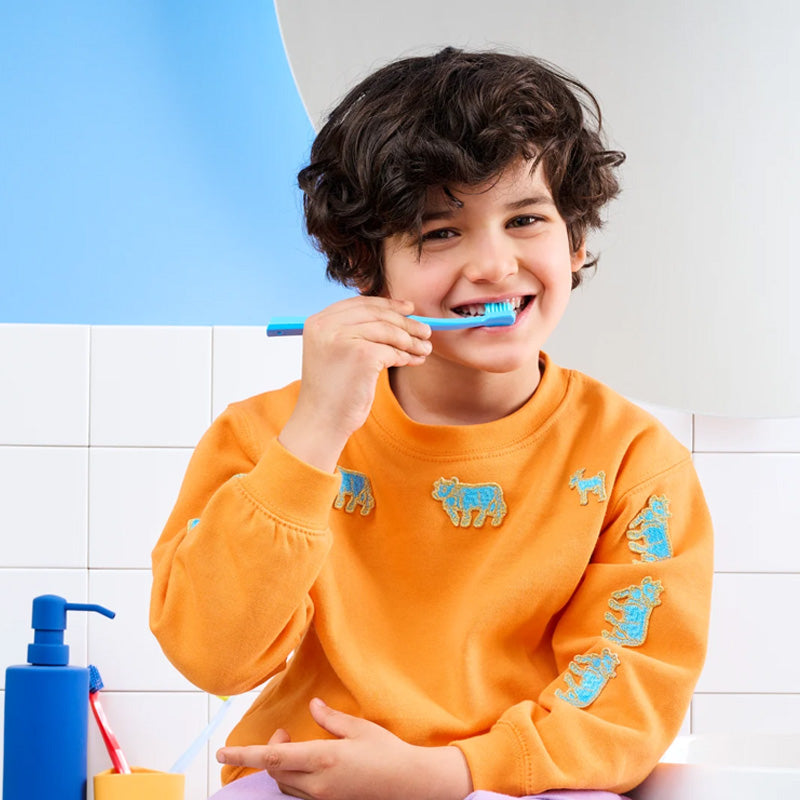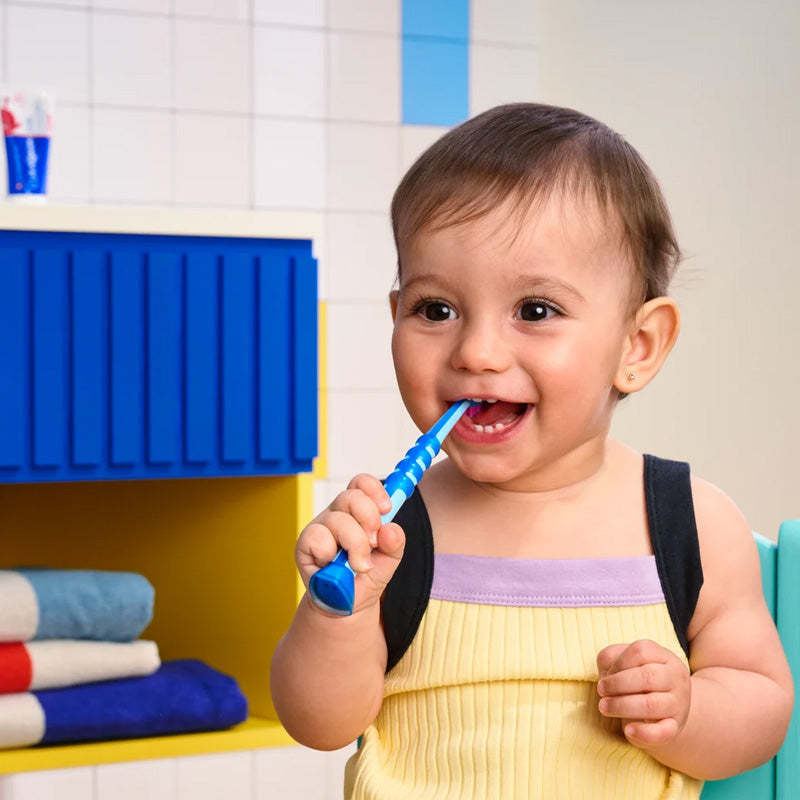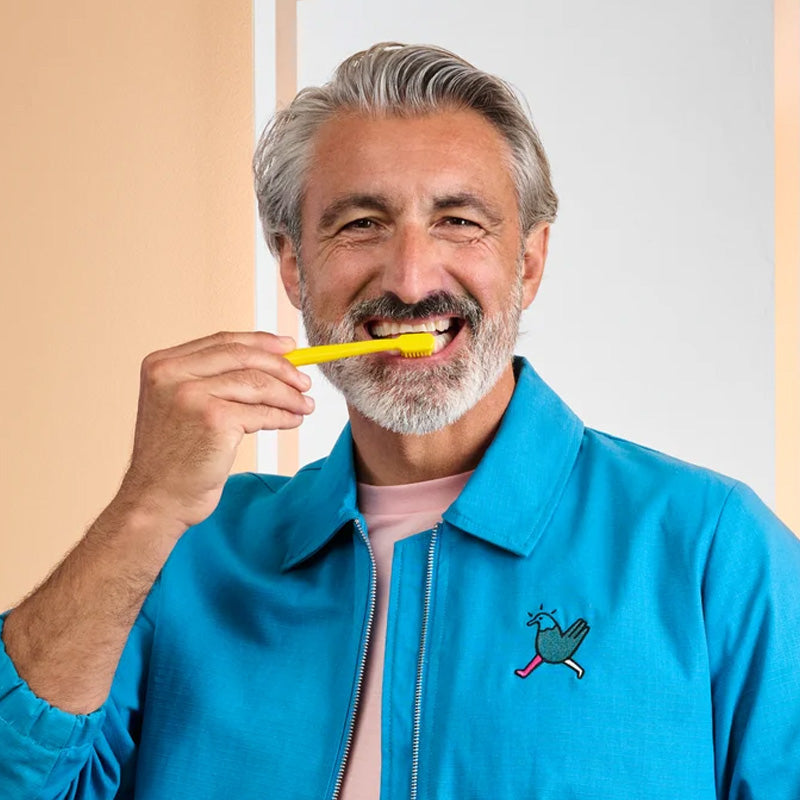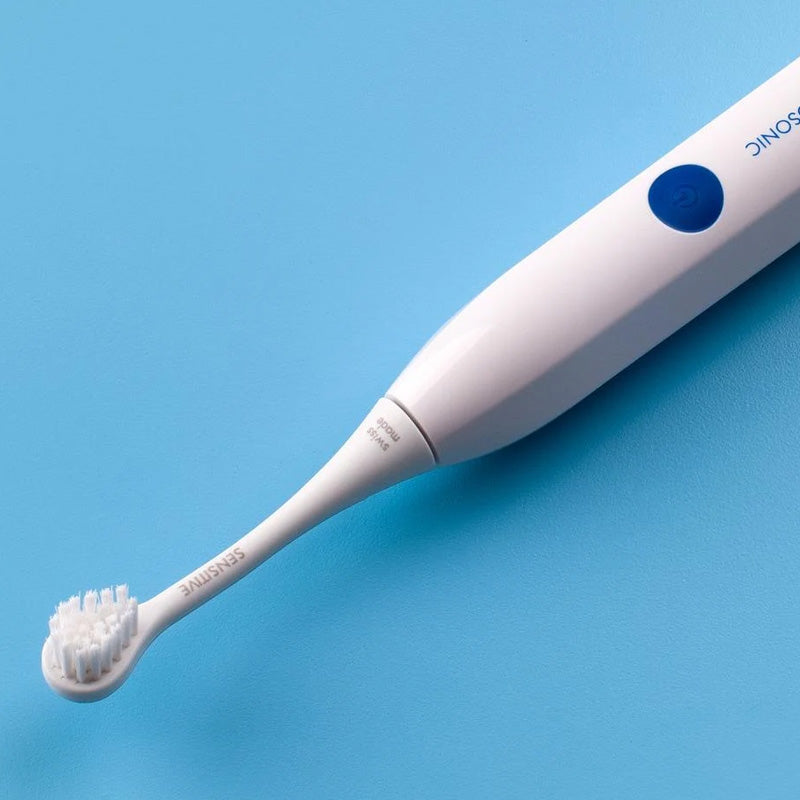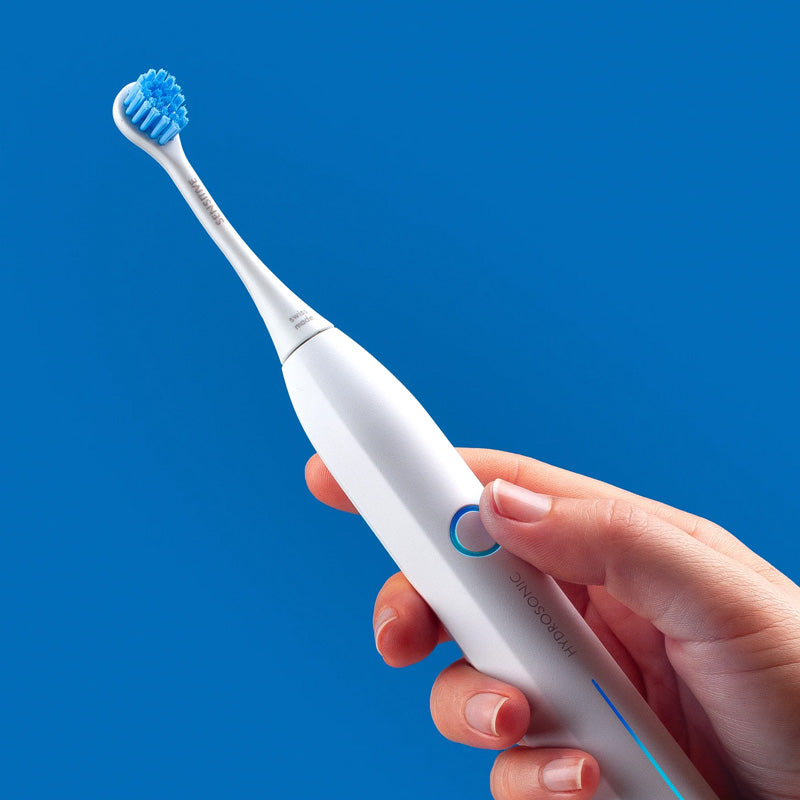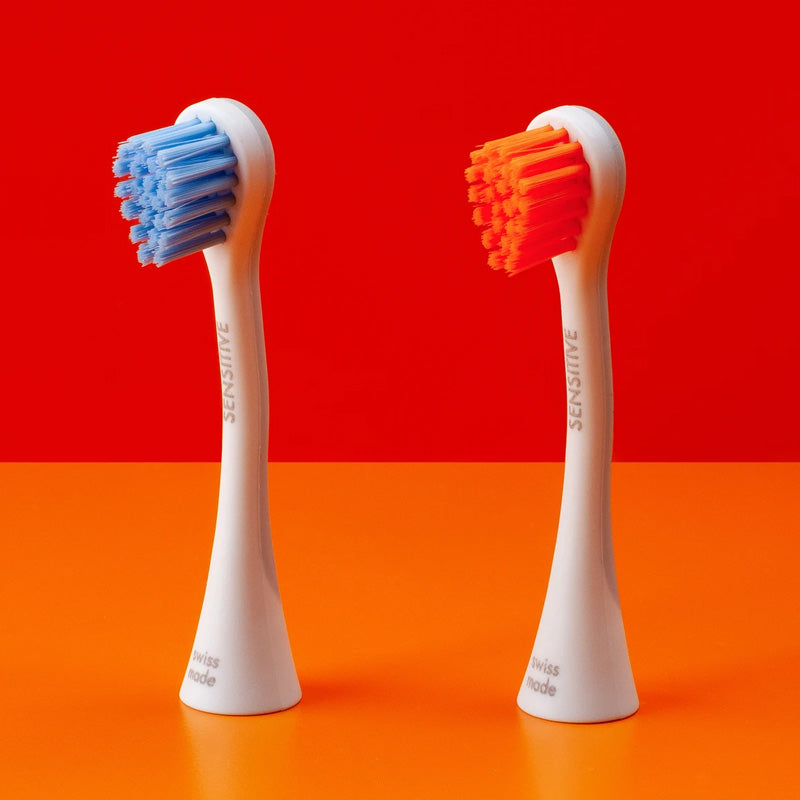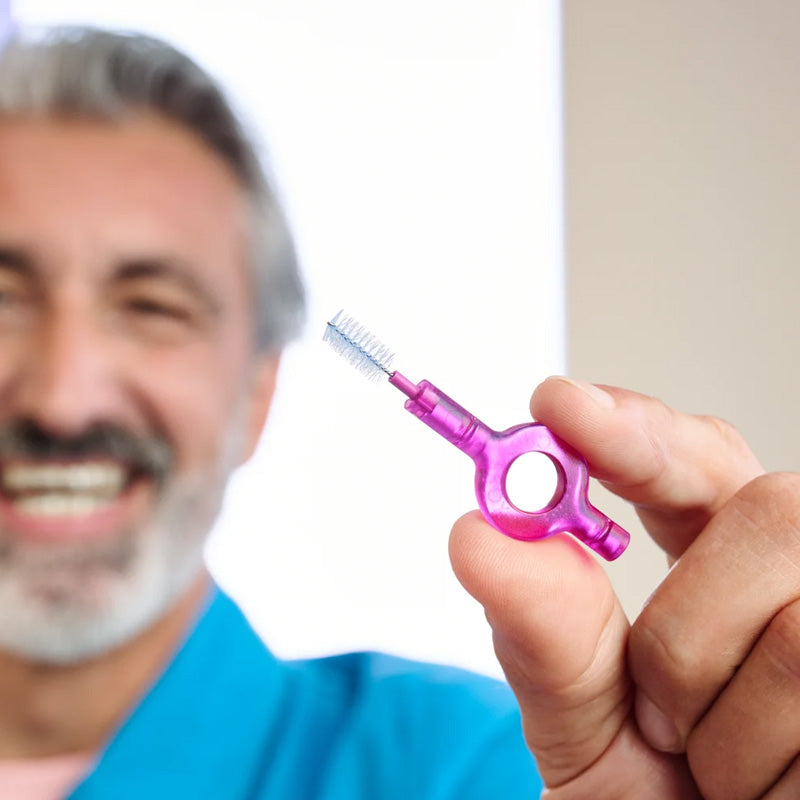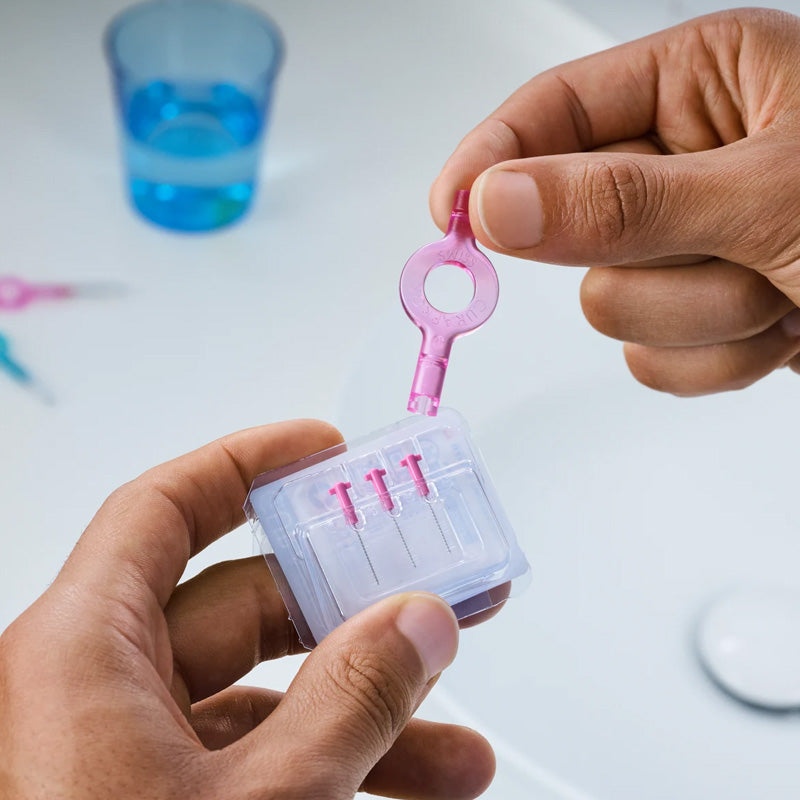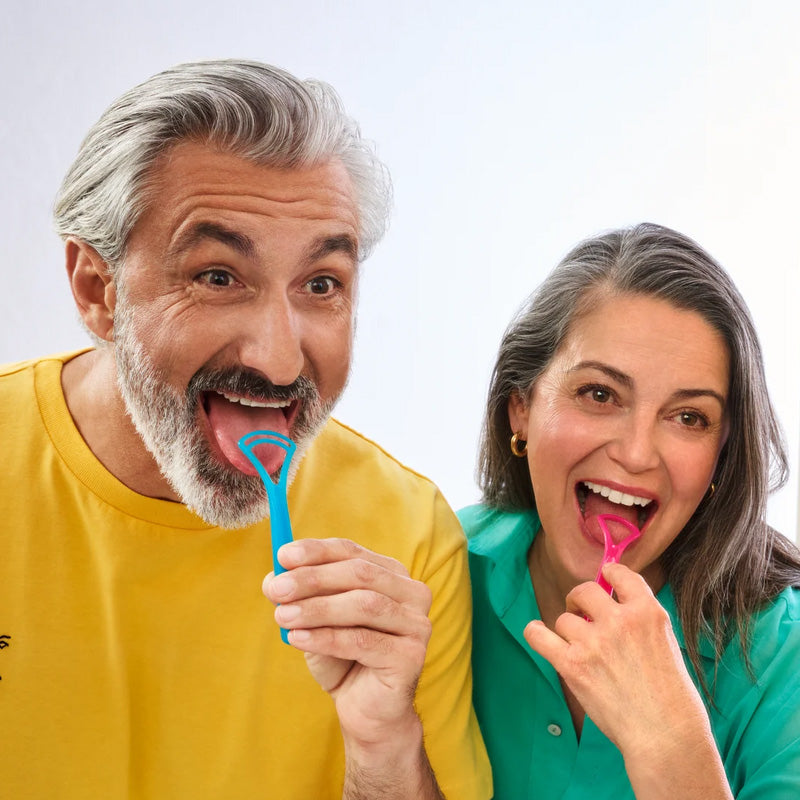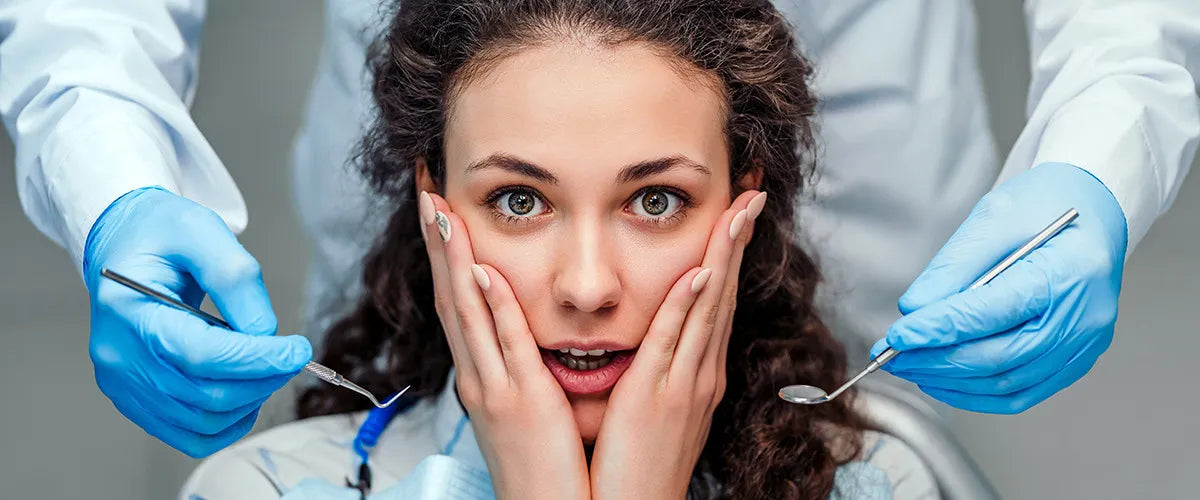Your hands are sweating, your heart is racing and your thoughts are racing. You feel like turning on your heel and running away. This is not an important exam or a test of courage, but an ordinary visit to the dentist. If this sounds familiar, you're not alone. In fact, more than half of Germans are afraid of the dentist. For five to ten per cent, the fear is particularly pronounced: they suffer from dental phobia.
In this article, you will learn everything you need to know about dental anxiety: Where does it come from? What can you do about it? And how do you find a dentist for anxious patients?
What is fear of the dentist?
Nobody really likes going to the dentist. Depending on the study, 60 to 80 per cent of the population suffer from anxiety before a visit to the dentist. The intensity of these feelings ranges from slight discomfort to physical symptoms such as anxious sweating. This means that very few patients are really relaxed.
This feeling of anxiety is normal. Fear is a natural protective reflex in our body to protect us from dangerous situations. It prevents us from jumping from high buildings or getting close to dangerous animals. In the modern world, however, it is not always useful: although dental treatment can be unpleasant, it is useful and necessary for the body. So we have to overcome our fear. As long as those affected go to the dentist despite their fear, everything is fine.
What is dental phobia?
It becomes problematic when those affected suffer from a panicky, extreme fear of the dentist and therefore no longer go to the dentist. Appointments are either not made at all, cancelled or not attended. This is referred to as dental phobia (technical term: dental phobia, oral phobia or odontophobia. In fact, the widely used term dental phobia is a little misleading: those affected are actually afraid of dental treatment and not of the dentist. Experts therefore also refer to it as dental treatment phobia. Dental phobia is much rarer than the widespread fear of the dentist: around five to ten per cent of Germans suffer from it and are considered "anxiety patients".
If those affected no longer attend dental appointments due to fear of the dentist, a vicious circle is created: as necessary dental treatment is not carried out, the situation worsens, meaning that subsequent treatment will be accompanied by more pain and discomfort. This prospect further increases dental anxiety. People with dental phobia often only go to the dentist when the suffering is unbearable - for example, in the case of acute root inflammation with severe toothache. There are numerous treatment options to break this vicious circle, which we will discuss in more detail later.
Dental phobia is one of the anxiety disorders ( ICD 10 Code: F 40.2). The following points distinguish it from the widespread "normal" fear of the dentist:
- Those affected no longer go to the dentist.
- The fear exceeds the actual danger.
- Permanent damage to teeth and gums is caused by missed treatments.
- The anxiety persists over a period of more than six months.
The information in this article is relevant and helpful both for patients with dental phobia and for people with a "normal" fear of the dentist.
Symptoms of dental anxiety
Different symptoms can occur depending on the severity of the dental phobia. In the case of dental phobia, odours or even just the thought of dental treatment can trigger physical symptoms.
The following symptoms can occur if you are afraid of the dentist:
- Feeling of anxiety
- Escape reflex (strong urge not to enter or leave the practice)
- Thought carousel
- Sweating hands
- Cold sweat, sweating
- Palpitations
- Increased pulse
- Circulatory problems
- Dizziness
- Trembling
- Feeling of powerlessness (feeling of being at the mercy of others)
- Sense of shame
- Strong physical tension, muscle cramp
- Dry mouth
- Nausea and vomiting
- Gastrointestinal complaints
- Shortness of breath
- Panic attacks
Possible consequences of dental phobia
Anyone who skips visits to the dentist for several years due to a very pronounced fear of the dentist is jeopardising their dental health. The likelihood of tooth and gum disease increases, caries can spread unhindered and destroy teeth. Possible problems cannot be recognised at an early stage. Many of those affected are ashamed of their bad teeth and withdraw from social life. Dental phobia can therefore severely restrict quality of life.
Here is an overview of the possible consequences:
- Increased risk of caries
- Increased risk of gum inflammation and periodontitis
- Bad breath
- Toothache
- Tooth loss due to untreated caries or periodontitis
- Language difficulties
- Impairments when eating
- Mental impairment (low self-esteem)
Good to know: Inflammation in the dental area can spread throughout the body via the bloodstream and trigger serious diseases in vital organs such as the heart and brain. For example, poor dental health can increase the risk of stroke and heart attack.
Causes: Why are people afraid of the dentist?
Fear of the dentist can have various causes: from fear of pain and a feeling of loss of control to traumatic experiences from your own childhood - or even a transfer of fear from your parents.
Fear of pain
One of the most common reasons for dental anxiety is the fear of possible pain. The sensation of pain is different for each person and is very subjective. Studies have shown that sensitivity to pain is further increased by fear and anxiety. The result is a kind of self-fulfilling prophecy: the more afraid we are of pain, the more sensitive we are to pain and the more pain we experience. Dentists can break this vicious circle by taking a particularly gentle approach and reassuring the patient. Conversely, the more relaxed we are, the less pain we experience.

Dental anxiety due to loss of control
Many people feel powerless and at the mercy of the dentist's chair. They have to allow a stranger to look into their mouth, a particularly private part of their body, and hear strange noises that they cannot categorise. The equipment used by the dentist doesn't exactly inspire confidence either. No wonder people feel uncomfortable in such a situation - especially if they have had negative experiences in the past. This brings us directly to the next point:
Dental anxiety due to traumatic experiences
Anyone who has had a bad experience at the dentist as a child often feels a strong sense of unease or even downright panic at upcoming dental appointments. This is especially true for older generations: Until the late 1980s, local anaesthesia was uncommon when treating children and visits to the dentist were therefore often associated with pain. A particularly brash demeanour from a dentist in childhood can also be a reason for dental anxiety. In the past, dentists were less known for their sensitive treatment, which is why many adults today are also afraid of injections, drills or tooth extractions and impressions.
Dental anxiety due to bad teeth
For anxious patients who have not been to the dentist for a long time, the actual fear of pain or loss of control is fuelled by fear of the dentist's reaction: they are afraid that the dentist will scold them - for example because of caries or severe tartar infestation. People with dental phobia are aware of the poor condition of their teeth and are ashamed of it.
Dental anxiety through projection
Children often develop a fear of the dentist because parents project their own fear onto the child. On the one hand, horror stories about pain at the dentist burn themselves into the child's subconscious. On the other hand, children can intuitively sense their parents' tension. Subconsciously, they have the feeling that something bad is about to happen.
Good to know: It's best if children don't develop a fear of dental treatment in the first place and if both tooth brushing routines and check-ups at the dentist are a matter of course. You can find out exactly what you need to bear in mind when brushing children's teeth in our article: Instructions: How to brush children's teeth properly
Diagnosis of dental phobia
You are not sure whether you suffer from a "normal" fear of the dentist or a dental phobia and would like some clarity? Then you can answer the questions on the "Dental Anxiety Scale" questionnaire or the "Hierarchical Anxiety Questionnaire". Dentists use these diagnostic tools to determine their patients' level of dental anxiety. They are also available online at many dental practices and are also listed here in the sources.
You rate your inner state in a range of different situations on a scale from "relaxed" to "sick with fear". The situations range from making an appointment with the dentist over the phone to getting the syringe or drill. The higher the score, the higher your dental anxiety.
Who certifies dental phobia?
If you need a certificate for dental phobia because you want to apply to your health insurance company for a general anaesthetic for dental treatment, you must consult a specialist (psychotherapist or psychiatrist) who can issue you with a psychological certificate. Other doctors require additional training to diagnose dental phobia.
Treatment: What to do about fear of the dentist?
Visiting the dentist doesn't have to be an ordeal - this also applies to patients with dental anxiety or dental treatment phobia. There are several effective therapy options to overcome the fear of the dentist so that dental treatments are much more relaxed in future. On the one hand, therapeutic measures can aim to overcome dental anxiety permanently in the long term or provide short-term relief during treatment.
Long-term therapy for dental anxiety
To permanently overcome the fear of the dentist, the S3 guideline of the German Society of Dentistry, Oral and Maxillofacial Surgery (DGZMK) recommends the following forms of therapy:
- 1st choice: Cognitive behavioural therapy
- 2nd choice: Eye Movement Desensitisation and Reprocessing (EMDR)
Cognitive behavioural therapy for dental anxiety
The first choice for long-term treatment of severe dental phobia is cognitive behavioural therapy (CBT), as it has been proven to provide great relief for anxiety patients. In this form of psychotherapy, a psychologist helps the anxious patient to recognise how negative thoughts and emotions influence their behaviour.
An integral part of cognitive behavioural therapy is usually also confrontation training, in which the patient is exposed to a fear-inducing stimulus - for example, the sound of the drill being played in the safe environment of the psychological practice. The first time this stimulus is played, it can trigger a strong feeling of anxiety because the patient associates the stimulus with a negative expectation. However, if the negative expectation does not materialise, the patient can form a new memory trace with repeated playback in which the stimulus no longer has a negative association. In this way, negative expectations regarding dental treatment are "reprogrammed". At the beginning of the treatment, the stimuli are often very harmless and are then gradually increased - right up to the actual visit to the dentist.
Eye Movement Desensitisation and Reprocessing (EMDR)
EMDR, which roughly translates as "desensitisation and processing through eye movements", was originally developed for the treatment of post-traumatic stress disorder (PTSD) and its effectiveness has already been proven. EMDR also showed effectiveness in a study with anxiety patients: one year after EMDR therapy, the majority of the participants were undergoing dental treatment - with a consistently low level of dental anxiety.

In EMDR therapy, the confrontation takes place at the thought level: Patients concentrate on a traumatic experience at the dentist while the therapist makes lateral movements with two fingers in front of the patient's eyes. This allows those affected to distance themselves from the traumatic experience.
Autogenic training
Through the relaxation techniques of autogenic training, you can learn to regulate your anxiety yourself. You do this by saying certain sentences in your mind to calm your body and mind. The success of this technique is measurable: blood pressure and heart rate regulate and patients feel much more relaxed. As the method is considered proven, health insurance companies often cover the costs of courses where patients with a fear of the dentist can learn relaxation techniques. You can use autogenic training to calm yourself down in any tense situation. We have listed it here under long-term solutions because you need to learn this technique first.
Progressive muscle relaxation
Similar to autogenic training, Jacobsen's progressive muscle relaxation also has an anxiety-relieving effect - but on a physical rather than mental level. This relaxation technique involves tensing specific muscle groups in order to achieve a state of deep relaxation throughout the body. You become more aware of your body and the muscle tension in your entire body decreases. This also automatically reduces emotional tension and nervousness. You can use this technique very well if you are afraid of going to the dentist beforehand. However, it also works well in the dentist's chair. However, you must first learn this relaxation technique.
Exchange with other affected persons
A sorrow shared is a sorrow halved. There are numerous internet forums where you can talk to other sufferers. In the safe space of the forum, you can be sure that nobody will judge you. On the contrary, you can find helpful tips and read testimonials from people who have overcome their fear of the dentist or who go to the dentist regularly despite their fear.
Short-term reduction of fear of the dentist
The next dentist appointment is already coming up and you don't have time for long-term forms of therapy? No problem! You don't have to cancel your appointment. In addition to the usual local anaesthetic, there are some treatment measures that can suppress your dental anxiety or even ensure that you don't notice anything about the treatment.
To reduce dental anxiety in the short term during treatment, the DGZMK recommends the following treatment measures:
- 1st choice: Benzodiazepines
- 2nd choice: nitrous oxide
- 3rd choice: General anaesthesia
Anxiety-relieving medication (benzodiazepines)
According to the DGZMK, the drug of choice to combat dental phobia during treatment is the administration of benzodiazepines. These are tablets that are taken orally and depress the central nervous system. In concrete terms, this means that patients have a reduced perception of emotions and external stimuli and can therefore undergo treatment.
Benzodiazepines are taken on an empty stomach. The effect sets in around half an hour after ingestion and usually lasts for around two hours. However, patients cannot leave the practice alone afterwards and are not fit to drive. If you want to take medication for dental anxiety, you should therefore always bring someone with you.
The disadvantage of benzodiazepines and other oral anxiolytics is that the dosage cannot be adjusted at any time and the effect cannot be assessed 100 per cent correctly. Dentists must therefore have experience in administering these drugs in order to be able to assess the effect appropriately. The dentist uses a local anaesthetic in addition to the sedative.
Additional anaesthetic methods for anxious patients
The local anaesthetic is actually sufficient for pain-free dental treatment. The dentist can also use a surface anaesthetic in the form of a spray or gel to avoid the pain of a puncture. If you are still afraid of pain and would like to experience the treatment at a greater distance - or have no memory of it at all - you can opt for laughing gas, twilight sleep, general anaesthesia or hypnosis.

Here is an overview:
- Nitrous oxide:Nitrous oxide is inhaled through the nose via a mask and has an anxiety-reducing and euphoric effect. The patient remains conscious and can respond to instructions. Adults can go home alone after the treatment.
- Twilight sleep:A mixture of painkillers, sleeping pills and sedatives puts the patient into a twilight sleep in which they can still breathe independently and respond to instructions, but have no memory of the treatment. You also need an accompanying person for this form of anaesthesia.
- General anaesthesia:With general anaesthesia, the patient is completely unconscious and cannot respond to instructions. They even have to be artificially ventilated. General anaesthesia is very stressful for the body and should only be used in an emergency. An accompanying person is also required here.
- Hypnosis:The patient is put into a trance-like state of relaxation in which the consciousness is focussed inwards and the fear recedes into the background. External stimuli such as odours and sounds are blocked out. Several sessions of preparation are required to reach the trance state.
The health insurance company does not usually pay for these additional anaesthetic methods. Therefore, anxious patients usually have to bear the costs themselves. However, you can apply to the health insurance company for the costs of general anaesthesia to be covered if a specialist has already diagnosed the dental treatment phobia. They must therefore be able to prove that they suffer from a phobia.
Good to know: You can find more information on the different anaesthetic methods in our article: Anaesthesia at the dentist
Homeopathy
Some dental practices use homeopathic remedies when treating patients with dental anxiety in order to alleviate fears and make treatment possible.
The following agents can be used:
- Argentum nitricum: for dental phobia and generally for severe nervousness and situation-specific anxiety
- Gelsemium: for over-excited, restless patients
- Arnica montana: for fear of being touched
- Silicea or Spigelia: for fear of anaesthetic injections
Even if some anxiety patients have had positive experiences with homeopathy, you should bear in mind that the effectiveness of homeopathic remedies has not yet been scientifically proven. A positive effect can often be attributed to the placebo effect. In simple terms: If a patient thinks that they have been given an effective remedy for dental anxiety, the anxiety often subsides automatically.
How do I find a dentist for anxiety patients?
If you suffer from a fear of the dentist, it is particularly important that you find a dental practice that you can trust. There are now many dentists who specialise in anxiety patients.
But how exactly do you find a dental practice you can trust? We've put together some tips for you here.
Checklist: How can I recognise a good dentist for anxiety patients?
These points are "green flags", i.e. good signs that signal that you are most likely in good hands.
- The practice specialises in anxiety patients and ideally already offers information on dental anxiety on its website.
- When you make an appointment, you get the feeling that your anxiety is being taken seriously.
- The dental staff and the dentist are understanding and may even express admiration for you having the courage to go to the dentist.
- The dental practice offers options for anxious patients (e.g. laughing gas, twilight sleep, hypnosis or general anaesthesia).
- You feel that you are in good hands because you are treated with respect and understanding.
- The overall atmosphere in the practice is positive and pleasant.
- As an anxiety patient, you can get an appointment at short notice and don't have to wait.
- They take time for you and answer all your questions patiently.
- You will not be rushed into treatment at your first appointment, but will be given comprehensive advice.
- During the treatment, the doctor will listen to you and be sensitive. Every step of the treatment is announced. He explains exactly what he is doing and asks you regularly how you are feeling and whether you need a break.
- The dentist will suggest a hand signal to indicate that you need a break.
Conversely, the following also applies: If you have a negative impression of a dental practice because you don't like the dentist or you have the feeling that they just want to give you a quick treatment, you should also listen to your gut feeling and look for a new dental practice. If someone makes derogatory comments about the condition of your teeth or your fear of the dentist, or doesn't take your fear seriously (e.g. "Don't make such a fuss"), this is a clear sign that you're at the wrong practice. Trust is the be-all and end-all for relaxed dental treatment.
A particularly good sign of a good dentist for anxiety patients is a recommendation in a forum. If another patient with dental anxiety has already had a good experience, it is very likely that your visit to the dentist will also be positive.
6 tips for a relaxed visit to the dentist with dental anxiety
We have already looked at the possible short and long-term treatment measures that can reduce your dental anxiety. Here we have put together a few more specific tips that can make your visit to the dentist more relaxed and pleasant - regardless of whether you feel slight discomfort or strong feelings of anxiety.
1. Take a trusted person with you
If you bring a companion with you, you are not on your own. On the one hand, you have someone with you who can reassure you and hold your hand. On the other hand, the person you trust can also observe from the outside whether everything is going normally and encourage you if your judgement is possibly clouded by anxiety. This emotional support can already greatly reduce your anxiety. When treating anxious patients, it is also common to have a consultation appointment first, during which the actual treatment is planned and discussed. During this consultation, the person accompanying you can also support you and, for example, ask the dentist to explain the procedure in detail and introduce you to various treatment methods.
Important: If you want to have dental treatment under twilight sleep or general anaesthetic, or if you want to take anxiolytic medication, you will need to bring someone with you because you will not be fit to drive after the treatment.
2. Tell the dentist about your dental anxiety
It is best to inform the dental staff that you are afraid of the dentist when you make your appointment over the phone. There's no need to be ashamed of it and try to hide your fear. You won't be doing yourself any favours and the dental staff and dentist will be able to deal with you much better if they are informed. What's more, you will often get an appointment more quickly and won't have to sit in the waiting room for long.
If you address your fear of the dentist directly, you will also see how the practice team reacts: are they understanding and do they take the time to talk to you? Then that's a very good sign.
3. Arrange a show of hands with the dentist
Many people are afraid of losing control at the dentist and feel "at the mercy". To avoid this, you can make a hand signal with your dentist before the treatment, signalling that you need a break or have a question. This way you remain in full control.
4. Let us explain the individual steps and devices to you
A good dentist for anxiety patients will explain each step of the treatment in detail before carrying it out. Instead of simply taking an appliance and putting it in your mouth, they will show you the appliance and explain how it works. They will also describe exactly what they will do in your mouth and how you are likely to react to it. Only then will they start the treatment. If your dentist does not automatically explain the appliances and steps to you, you can simply ask them politely.
5. Distract yourself
Some dental surgeries offer music or videos to distract you. However, you can also simply take your smartphone and headphones with you and listen to your own favourite playlist, your favourite podcast or an audio book. On the one hand, this creates positive feelings, while on the other, the auditory input also distracts you from the background noise, which is often perceived as unpleasant, and makes time pass more quickly. Classical music and meditation music are said to be particularly effective.

6. Use relaxation exercises to calm down
If you have already taken an autogenic training course or regularly practise Jacobsen progressive muscle relaxation, the dentist's chair is the perfect place to do your relaxation exercises. If you haven't done any relaxation exercises before, you can concentrate on your breathing and inhale and exhale as slowly as possible. Important: The exhalation should take longer than the inhalation. A mental journey to a beautiful place can also distract you from the treatment. Simply visualise in as much detail as possible where you would like to be and what you would like to do.
Follow-up and prophylaxis for dental anxiety
After your dental treatment, it is best to make an appointment for your next check-up directly at the practice. The fact is that the more regularly you go for check-ups, the less you have to worry about. After all, the dentist can recognise potential problems immediately and thus prevent painful diseases such as tooth decay.
It also makes sense to stay on the ball in terms of confrontation training. Once you have managed to go to the dentist, the next treatment will probably be more relaxed. You have already experienced that nothing bad has happened to you and are starting to reprogramme your brain. After the treatment, it's best to reflect on exactly how the treatment went: What was good? What scared you? Did you feel any pain? If everything was actually okay, you should regularly make yourself aware of this. The more positive experiences you have, the less afraid you will be of the dentist.
If you are active in a forum for anxiety patients, you should definitely share your experiences. Positive reports give other sufferers courage. In addition, you have every reason to be proud if you have overcome your fear of the dentist and attended a dental appointment.
Thorough dental hygiene
If you are afraid of painful procedures at the dentist, the very best remedy is avoidance: If you take extra care of your teeth, the risk of painful illnesses and treatments is significantly lower.
We have summarised the most important parts of the tooth brushing routine for you here:
- Brush your teeth twice a day for about three minutes - in the morning after breakfast and in the evening just before going to bed
- Use fluoride toothpaste - for example the 'Be you' toothpaste from Curaprox
- Clean the interdental spaces once a day with an interdental brush - regardless of the time of day
- Clean the tongue once a day with a tongue scraper
But what exactly is the correct tooth brushing technique? And how do you clean the spaces between your teeth properly? We'll tell you in our detailed instructions:
Instructions: Brush your teeth properly
Instructions: Clean interdental spaces properly
Instructions: Brushing your teeth with an electric toothbrush
Instructions: Using a tongue scraper correctly
Good to know: Did you know that you can clean your teeth much more thoroughly with a soft toothbrush than with a hard one? The has 5,460 super-fine bristles that are especially gentle on your gums and particularly effective against plaque. That's why dental professionals around the world have been recommending it for over 40 years.
Sources
- Anxiety-free visits to the dentist: Hierarchical Anxiety Questionnaire (HAF) according to Jöhren 1999.
- Antwerpes, Frank et al: Oralophobia, at: flexikon.doccheck.com
- Burghardt, Sophia: Non-pharmacological interventions for reducing mental distress in patients undergoing dental procedures: Systematic review and meta-analysis, in: Journal of Dentistry. 2018.
- German Society of Dentistry, Oral and Maxillofacial Medicine (DGZMK): S3 guideline (long version). Dental anxiety in adults.
- German Institute of Medical Documentation and Information: ICD-10-GM Version 2018 Chapter V Mental and behavioural disorders (F00-F99).
- Dr Gal: Fear of the dentist.
- Farspour dental practice: Relaxation helps against the fear of the dentist.
- Fessler, Beate: The spectre of the dentist. Reducing fear with education, behavioural therapy and homeopathy, on: deutsche-apotheker-zeitung.de.
- Geo: Dentists can smell fear - and that has consequences for the patient.
- Institute for Dental Sedation: Benzodiazepines.
- Krämer, Jette: Bundeszahnärztekammer: Every tenth person is very afraid of going to the dentist. Nationwide survey on dental care, on: presseportal.de.
- Mathers, Frank: Oral sedation in everyday dental practice, on: dzw.de.
- Schorr, Susanne: Dental anxiety, on: netdoktor.de.
- SWR: The fear of the dentist.
- Tönnies, Sven et al.: The Dental Anxiety Scale (DAS) and the Dental Fear Survey (DFS) - Two instruments for measuring dental treatment anxiety, in: Zeitschrift für Medizinische Psychologie. 2002.
- Yigit, Tugba et al: The effect of parental presence and dental anxiety on children's fear during dental procedures: A randomised trial, in: Clinical Child Psychology and Psychiatry. 2022.
- YouGov: Every second German is afraid of the dentist.
- Dental practice in Leonberg: Fear of dental treatment - these relaxation exercises help.
All websites last accessed on 23/11/2023.
Read more

It can be quite startling to look in the mirror and suddenly discover red patches with white borders on your tongue. Despite looking slightly scary, this disorder is harmless. Geographic tongue is ...
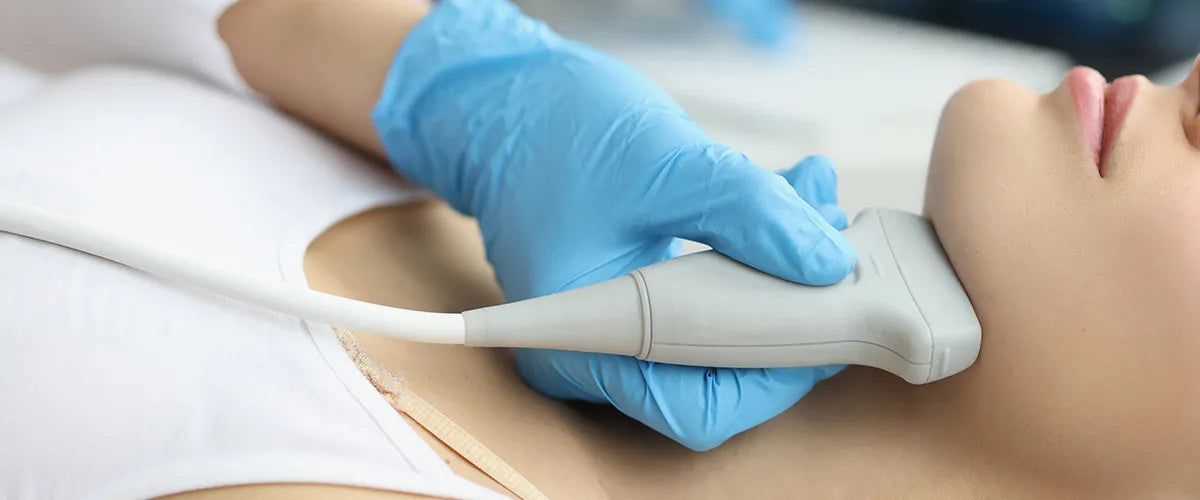
Jaw cancer, which originates directly in the jawbone, is a very rare form of cancer. More commonly, malignant tumours from adjacent areas in the mouth metastasise to the jaw. Discover everything yo...
